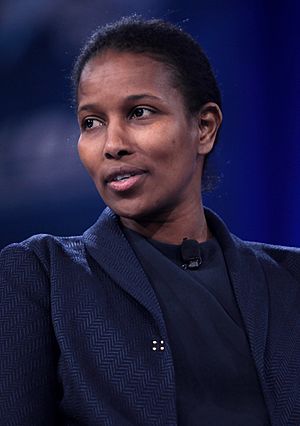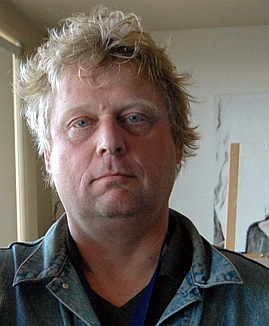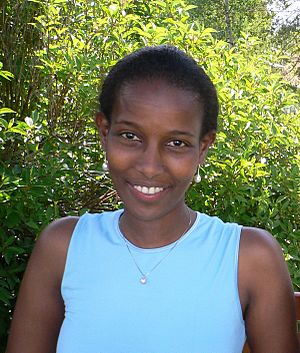Ayaan Hirsi Ali facts for kids
Quick facts for kids
Ayaan Hirsi Ali
|
|
|---|---|

Hirsi Ali in 2016
|
|
| Born |
Ayaan Hirsi Ali
13 November 1969 Mogadishu, Banaadir, Somali Democratic Republic
|
| Citizenship |
|
| Alma mater | Leiden University (MSc) |
| Occupation |
|
| Employer | Harvard University Hoover Institution, Stanford University |
| Organization | AHA Foundation |
| Known for |
|
|
Notable work
|
|
| Political party |
|
| Spouse(s) | |
| Children | 2 |
| Member of the House of Representatives | |
| In office 2003–2006 |
|
Ayaan Hirsi Ali (born 13 November 1969) is a writer, activist, and former politician. She was born in Somalia and later became a citizen of the Netherlands and then the United States.
She is known for speaking out about women's rights. She works to protect Muslim women from harmful practices like forced marriage and child marriage. Hirsi Ali has also shared her views on Islam.
Her family moved to different countries in Africa and the Middle East. When she was 23, she found safety in the Netherlands. Five years later, she became a Dutch citizen. In her early 30s, she changed her beliefs from Islam to atheism. Later, in 2022, she announced she had become a Christian.
In 2003, Hirsi Ali was elected to the Dutch Parliament. While serving, she worked on a short film called Submission. This film showed how women were treated under strict religious laws. The film led to threats against her life. A filmmaker she worked with, Theo van Gogh, was sadly murdered. This event made Hirsi Ali speak even more strongly about her views.
In 2005, Time magazine named her one of the 100 most influential people in the world. Because of her strong opinions, she became a debated figure in Dutch politics. After a disagreement about her Dutch citizenship, she left Parliament and the Netherlands.
She then moved to the United States. There, she became a well-known writer and activist. Her books, including Infidel: My Life (2007) and Nomad: From Islam to America (2010), became very popular. She also started an organization called the AHA Foundation. This group works to defend women's rights. She has worked at important universities like Stanford University and Harvard University.
Hirsi Ali has received several awards for her work. These include prizes for free speech and democracy. Some people have criticized her views, saying they are unfair to Islam. She is married to the historian Niall Ferguson. They are raising their two sons in the United States, where she became a citizen in 2013.
Contents
Ayaan's Early Life
Ayaan Hirsi Ali was born in Mogadishu, Somalia, in 1969. Her father, Hirsi Magan Isse, was an important leader in the Somali Revolution. He was put in prison because he was against the government at the time. He was a smart person and a devoted Muslim.
After her father escaped from prison, their family left Somalia in 1977. They lived in Saudi Arabia and Ethiopia before settling in Nairobi, Kenya, by 1980. There, they had a comfortable life. Ayaan went to the English-language Muslim Girls' Secondary School.
As she grew up, Saudi Arabia was funding religious education in many countries. Its religious ideas became very important to many Muslims. A religious teacher, trained with these ideas, joined Ayaan's school. This teacher inspired Ayaan and some friends to follow stricter religious rules. Ayaan later said she loved the Qur'an and lived "by the Book" when she was young.
She supported the ideas of the Muslim Brotherhood, a group that follows strict Islamic rules. She wore a hijab with her school uniform. This was not common then but is more so now. She also agreed with the fatwa (a religious ruling) against writer Salman Rushdie. This was because of his book The Satanic Verses. After high school, Ayaan took a secretarial course in Nairobi.
She also enjoyed reading English adventure stories, like the Nancy Drew series. These stories featured strong female characters who challenged society. Ayaan remembered her grandmother bravely stopping soldiers from entering their home. She felt she became like her grandmother, strong and independent, but in a different way.
Life in the Netherlands
Moving to the Netherlands
Hirsi Ali arrived in the Netherlands in 1992. She had traveled from Kenya to visit family in Germany. She then went to the Netherlands to escape a forced marriage that she did not want. There, she asked for political asylum (protection from her home country). She quickly received permission to live there. She used her grandfather's old family name on her application.
At first, she worked many different short jobs, like cleaning and sorting mail. She also worked as a translator at a refugee center. This experience deeply affected her.
In the Netherlands, she found new books and ideas that made her think differently. She studied Sigmund Freud's work, which showed her a different way of thinking about morals, not based on religion. She learned Dutch and studied social work. She was impressed by how well Dutch society worked. To understand it better, she studied political science at Leiden University. She earned a master's degree there.
From 1995 to 2001, Hirsi Ali worked as a translator for Somali people. She often worked with Somali women in refugee centers and shelters for abused women. She also worked for the Dutch immigration service. She became critical of how the service handled people seeking asylum. Hirsi Ali speaks six languages: English, Somali, Arabic, Swahili, Amharic, and Dutch.
Becoming a Politician
After getting her degree, Hirsi Ali worked for a political research group called the Wiardi Beckman Stichting (WBS). This group was linked to the center-left Labour Party. Her writing there was inspired by the ideas of scholar Bernard Lewis.
She became less connected to Islam. The September 11 attacks in the United States in 2001 shocked her. She listened to recordings where Osama bin Laden used quotes from the Qur'an to justify the attacks. She then read the Qur'an and other religious texts herself. She said she found the quotes Bin Laden used. This made her see the Qur'an as a historical record, "just another book."
Reading a book called Atheist Manifesto helped her decide to leave religion. In 2002, she announced she no longer believed in God. She began to speak out about her views on Islam and Islamic culture. She wrote many articles and appeared on TV shows. She shared her ideas in a book called De zoontjesfabriek (The Son Factory) in 2002. Around this time, she started receiving threats.
A magazine editor introduced Hirsi Ali to leaders of the center-right People's Party for Freedom and Democracy (VVD). They encouraged her to join their party and run for Parliament. In 2003, at age 33, Hirsi Ali won a seat in Parliament. She believed the Dutch government had not done enough to help Muslim women and girls who were being abused or isolated.
While in Parliament, Hirsi Ali continued to criticize certain aspects of Islam. Many of her statements caused debate.
Film with Theo van Gogh
Hirsi Ali worked with writer and director Theo van Gogh. She wrote the script and spoke the voice-over for their short film, Submission (2004). The film criticized how women were treated in some Islamic societies. It showed actresses playing Muslim women who were suffering. Passages from the Qur'an were written on their skin. These texts are sometimes seen as supporting the control of Muslim women. The film made many Dutch Muslims very angry.
On 2 November 2004, Mohammed Bouyeri, a Dutch Moroccan extremist, murdered Van Gogh in Amsterdam. The Dutch secret service immediately increased security for Hirsi Ali. Bouyeri was sentenced to life in prison.
In 2004, a rap song called "Hirsi Ali Dis" was released online. It included threats against her life. The rappers were charged and later sentenced to community service.
Hirsi Ali had to go into hiding. The government moved her to different safe places in the Netherlands. She also lived in the United States for several months. She returned to Parliament in January 2005.
In January 2006, Reader's Digest magazine named Hirsi Ali "European of the Year." In her speech, she spoke about preventing Iran from getting nuclear weapons. She also said that "Western values" like freedom and justice are for everyone. She believed Europe had done well in providing justice by allowing free thought and debate. She said communities need to be able to examine all ideas to improve. A Norwegian politician nominated her for the Nobel Peace Prize that same month.
In March 2006, she signed a letter called "MANIFESTO: Together facing the new totalitarianism" with other important figures, including Salman Rushdie. The letter supported freedom of the press and expression.
In April 2006, a Dutch judge ruled that Hirsi Ali had to leave her secure house. Her neighbors had complained about the security risk. However, the police said it was one of the safest places because of her protection. In 2007, a special group called the Foundation for Freedom of Expression was created to help pay for her protection and other Muslim activists.
Life in the United States
In 2006, Hirsi Ali started working at the American Enterprise Institute in Washington, D.C. The Dutch government continued to pay for her security, which became more expensive.
In April 2007, some people in Johnstown, Pennsylvania, protested her planned speech at the University of Pittsburgh. A local religious leader said she deserved the death penalty.
On 25 September 2007, Hirsi Ali received her green card, which allowed her to live permanently in the U.S. In October 2007, she returned to the Netherlands briefly. The Dutch government decided it would no longer pay for her security when she was abroad. She turned down an offer to live in Denmark, planning to return to the United States.
On 25 April 2013, she became a citizen of the United States. From 2016 to 2019, she was a Fellow at the Harvard Kennedy School.
Views on Islam
In October 2016, a group called the Southern Poverty Law Center (SPLC) called Ayaan and another Muslim activist "anti-Muslim extremists." This caused many protests in newspapers. The Lantos Foundation for Human Rights & Justice asked the SPLC to remove them from the list. In April 2018, the SPLC removed the entire "Anti-Muslim Extremist" list.
In April 2017, she canceled a planned trip to Australia. This happened after a video was released by six Australian Muslim women. They said she was a "star of the global Islamophobia industry" and made money from "dehumanizing Muslim women." Hirsi Ali said these women were supporting radical Islamic causes. She also said "Islamophobia" was a made-up word. She stated that her trip was canceled due to planning problems.
Social and Political Views
Hirsi Ali joined the VVD political party in 2002. This party supports classic liberal ideas about the economy, foreign policy, crime, and immigration. She has said she admires Frits Bolkestein, a former European leader and a key thinker for the party.
Hirsi Ali is the founder and president of the AHA Foundation. This is a non-profit group that helps protect women and girls in the U.S. from political Islam and harmful traditional practices. These practices often go against U.S. law and international agreements. Through the AHA Foundation, Hirsi Ali works against denying girls education, forced marriage, and hiding information about these issues. She believes that freedom of religion and speech should not be used to excuse these harmful acts.
Hirsi Ali has often praised western liberalism.
Personal Life
Hirsi Ali married British-American historian Niall Ferguson on 10 September 2011. They have two sons together.
In 2023, Hirsi Ali announced that she had become a Christian.
Awards
- 2004, she received the Prize of Liberty from a Belgian liberal group called Nova Civitas.
- 2004, she was given the Freedom Prize by Denmark's Liberal Party. This was for her work to promote free speech and women's rights.
After her friend Theo van Gogh was murdered, Hirsi Ali received five awards for her activism in 2005.
- 2005, she won the Harriet Freezerring Emancipation Prize.
- 2005, she received the European Bellwether Prize from a Norwegian group. They called her "the leading European politician in the field of integration."
- 2005, she was given the annual Democracy Prize by the Swedish Liberal People's Party. This was for her brave work for democracy, human rights, and women's rights.
- 2005, Time magazine named her one of the 100 Most Influential Persons of the World.
- 2005, she received the Tolerance Prize of Madrid.
- In 2006, Reader's Digest magazine voted her European of the Year.
- 2006, she received the Glas der Vernunft (Glass of Reason) prize in Germany. This was for her courage in criticizing Islam.
- 2006, she received the Moral Courage Award from the American Jewish Committee.
- 2007, she was given the annual Goldwater Award from the Goldwater Institute in Arizona.
- 2008, she received the Simone de Beauvoir Prize, an international human rights prize for women's freedom. She shared this award with Taslima Nasreen.
- 2008, she won the Anisfield-Wolf Book Award for her autobiography Infidel. This award recognizes books that help us understand different cultures.
- 2010, she received the Emperor Has No Clothes Award.
- 2016, she was awarded the Philip Merrill Award for Outstanding Contributions to Liberal Arts Education.
- 2017, she received the Oxi Day Courage Award.
See Also
 In Spanish: Ayaan Hirsi Ali para niños
In Spanish: Ayaan Hirsi Ali para niños
- Yasmine Mohammed
- Maryam Namazie
- Mona Walter



